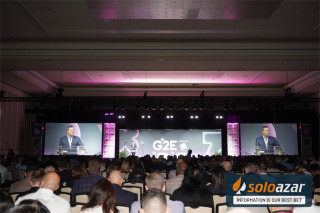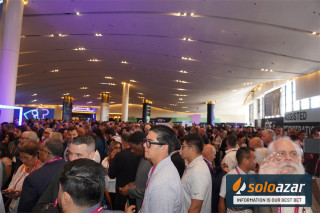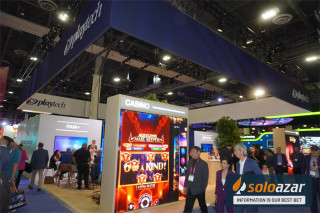Newton Cardoso Jr.: ´Brazil is missing the bus of history because it does not legalize games´
Wednesday 10 de February 2021 / 07:12
2 minutos de lectura
(Brazil).- Federal deputy Newton Cardoso Jr., an active member of the Tourism Commission and the Finance and Taxation Committee of the Federal Chamber, said in an interview with the Brazilian media Tribuna da Imprensa Livre, that games in Brazil can generate: “A collection of taxes above R $ 30 billion (US$ 5.5 billion) with legalization. What is more important, 500 thousand jobs can be generated from the installation of various concessions throughout Brazil ”.

Private sector managed cash gambling in Brazil is on the agenda of the Chamber of Deputies. What is the discussion on the matter?
The issue of gambling regulation in Brazil is undoubtedly controversial. There is a general understanding among a segment of opinion formers and the mainstream media that this activity has strong links to organized crime, in addition to promoting money laundering, encouraging prostitution and negatively impacting people's lives due to addiction. gambling or gambling. But, are these arguments solid and are they the true cause of the rejection, typical of this social segment, to the legalization of the activity?
The truth is that the decision to regulate and legalize games in Brazil corresponds exclusively to the National Congress, the representative house of the people and cradle of the rules that govern life in society. The topic is divided into three areas within the scope of the internal discussion.
First, considered the main axis of organization of activity in Brazil, the Regulatory Framework of the Games. Although several bills are in process in the Senate and the Chamber of Deputies, PL 442/91 is the one that seems to collect most of the GDP of games in its legal text. This PL received a favorable opinion in 2017 from the Special Committee set up for its recognition. Covers Casinos, Bingos, Sports Betting, Video Games, Virtual or Electronic Gambling and also the Animal Game. Second, the issue of lotteries. There is a never-ending battle between concentrating power at the federal level to exploit this type of game or allowing the States and Municipalities to also constitute their legitimate concessions for this specific type of game. Here are also the drawings, capital letters and other derived models. An area of the fortune economy that is judicialized by the desire of different states to seize the tax collection that comes from lotteries. Third and last, sports betting.
In 2018, Congress made progress on the regulatory board by allowing sports betting in Brazil. This law has not yet “triumphed”, basically because the Federal Government regulation has not yet found the appropriate fiscal model for the market and also because the participation of Sports continues to be an uncertainty and it lacks an aggregator that talks to all the actors of Sport in the country. Everything said above serves to guide the answer to the question: How does Congress enter the game in 2021? Basically no big strides.
If there is a positive point, it is the declared desire of the economic area of the Government to see the games as part of the federal income under President Bolsonaro. Another highlight is a recent poll conducted among congressmen, in which more than 60% declared in favor of the regulation of games in Brazil. 2021 is a year of recovery, in every way. On the Congress agenda are projects such as Tax, Administrative Reform, Central Bank Autonomy, etc.
Legalizing games can and should be on the agenda. Passing legislation, even this year, that allows the country to explore the activity of wealth becomes a fundamental step in the process of economic recovery with the generation of employment and income.
Is the legal frame ready for the games?
As we discussed earlier, PL 442/91, known as the Gaming Regulatory Framework, is the legal text that releases the largest number of activities among known games of fortune. It is the ideal text, although it may encounter occasional difficulties when it actually reaches the plenary session. There is no priority of one activity over another in the text, but the return of Casinos in Brazil is emblematic and has an aura of nostalgia that arouses both the curiosity of many and the rejection of some. On the other hand, the discussion about the rise of electronic games over physical ones is marginal to the text of the law.
This seemingly irreversible process occurs across the globe and may have been heavily catalyzed by the pandemic that originated in 2020.
Has there been an overvaluation of the Casinos Resorts?
Sure. The feeling that is perceived in Congress is that the launch of the Casino Resort already represents a step forward, a paradigm break in the legalization of games. That old maxim: Good is the enemy of excellence.
What is the order of priorities?
There is no prioritization of a particular region to the detriment of another in the law, and even Congress does not accept such a classification. It is important to remember, of course, the need to let the market regulate itself in terms of project implementation feasibility. If a Casino fits in any city, it is market research that will tell, never Congress.
What is the bill that is being processed with the most force in the National Congress?
PL442 / 91, which has a preference for integrated tourist complexes, but the amendment that I approved with the rapporteur at the time of the Special Commission maintains that specific regions of the country, regions such as hydro-mineral complexes may be exempt from installing tourist complexes as a requirement to have Casinos operating in these.
Could municipalities that have suffered during the Covid 19 pandemic benefit from the regulation?
Tax revenues of more than R $ 30 billion (US$ 5.5 billion) are estimated with the legalization of games in Brazil. What's more, more importantly, 500,000 jobs can be created by installing various concessions throughout Brazil. Tourism, the first to be impacted by the pandemic and probably the last to get rid of its harmful effects, can greatly benefit and has a direct link with the legalization of the activity.
Does the casino tradition in Minas Gerais deserve respect and recognition?
Minas Gerais is a good example in terms of the operation and history of the games. It was not enough to have received the first Casino in Brazil, in 1897 in the city of Caxambu, there is a moral debt with the cities of the water circuit, our hydro-mineral farms, because the economic viability of several of them was harvested without prior notice, more than 70 years ago, when the games were suddenly banned. With the amendment I approved in PL442 / 91, one hope is renewed: the right of these resorts to operate Casinos without the need to build integrated resorts. It would be the independent casinos, so recognized by the UNLV studies in Las Vegas, comparing the different North American regions in terms of the income and operation of the games.
Have you visited countries where games are a natural part of economic activities?
I visited Portugal, Las Vegas in the US, Macao and Foz do Iguaçu in Brazil. I know from personal experience Punta del Este in Uruguay, London in England and Atlantic City in the United States. In each mission that I participated with colleagues from the Tourism Commission, I was able to consolidate the following thought: Brazil is losing the train of history by not legalizing games and fixing the idea of releasing only integrated tourist complexes is to obstruct the right to development of different regions of our vast country.
In April, the Federal Supreme Court (STF) will judge whether or not the Law on Minor Criminal Offenses was approved by the 1988 Citizen Constitution. Can it be regulated through the Supreme Court?
The Supreme Court is the institution that most values stability in the country and that seeks greater legal security, regardless of the controversy that may exist on any subject. I doubt that our highest court will propose such a change without first aligning with Congress the consequences of a possible revision of the legal text, however old-fashioned its content may seem.
Do the president and ministers admit the regulation?
There is division within the Executive. Such a division could be resolved by presidential will, but certainly the economy, more favorable than contrary, has a decisive weight when analyzing the positive impact of employment and the collection of taxes in the long term.
Categoría:Legislation
Tags: Sin tags
País: Brazil
Event
G2E - Las Vegas 2025
06 de October 2025
Korbi Carrison on 25 Years of G2E: "It’s crucial to stay ahead of trends"
(Las Vegas, SoloAzar Exclusive).- In this interview, Korbi Carrison, Event Vice President of G2E at RX USA, reflects on the success of G2E’s 25th anniversary edition in Las Vegas, sharing insights on the event’s evolution, key highlights, and what this landmark celebration means for the future of the gaming industry.
Tuesday 04 Nov 2025 / 12:00
CT Interactive on Innovation, Networking, and Market Growth at G2E 2025
(Las Vegas, SoloAzar Exclusive).- The global gaming industry marked G2E’s 25th anniversary with a major gathering in Las Vegas. CT Interactive stood out for its innovative product development and international growth strategy. Account Manager LATAM at CT Interactive, Roberto Muñoz, shared insights on G2E’s importance, emerging trends, and the company’s collaborative expansion efforts.
Thursday 30 Oct 2025 / 12:00
Atlaslive Explored the Future of Gaming in Latin America at Recent G2E 2025
(Las Vegas, SoloAzar Exclusive).- Bruno Almeida, Head of Sales LATAM at Atlaslive, attended G2E for the first time to explore how land-based and online gaming are converging. His experience highlighted key trends shaping the Latin American market, from immersive casino innovations to strategic networking and regulatory insights.
Monday 27 Oct 2025 / 12:00
SUSCRIBIRSE
Para suscribirse a nuestro newsletter, complete sus datos
Reciba todo el contenido más reciente en su correo electrónico varias veces al mes.



























